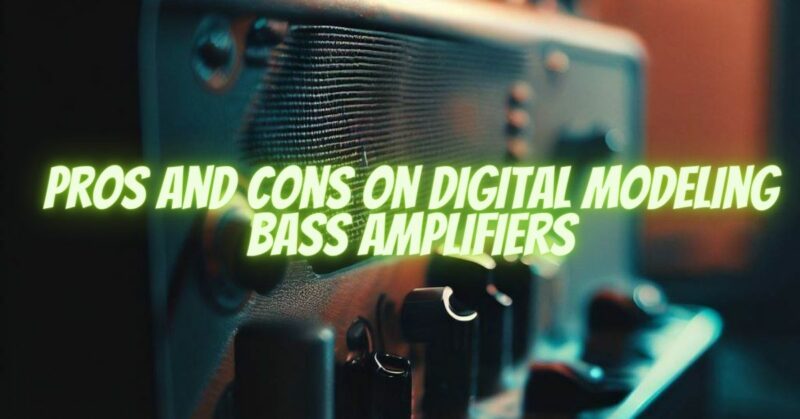Digital modeling bass amplifiers have revolutionized the way bassists shape their tone and explore various sound possibilities. These technologically advanced amps offer a wide range of amp and effect simulations, allowing bass players to replicate the sounds of iconic bass rigs with ease. In this article, we will delve into the pros and cons of digital modeling bass amplifiers, shedding light on their advantages and potential drawbacks.
Pros:
- Versatility and Flexibility: One of the significant advantages of digital modeling bass amplifiers is their unparalleled versatility. These amps often come equipped with a vast array of amp and effect models, offering bassists the opportunity to experiment with different tones, styles, and genres. From classic vintage tube amp simulations to modern solid-state powerhouses, digital modeling amps can replicate a wide spectrum of sounds, providing endless possibilities for creative expression.
- Portability and Convenience: Digital modeling bass amplifiers are often compact and lightweight, making them highly portable and convenient for gigging musicians. Unlike their analog counterparts, which can be bulky and heavy, digital modeling amps are designed with modern convenience in mind. They are easy to transport, making them ideal for touring musicians and bassists who value portability without compromising on tone.
- Consistency and Reliability: Digital modeling amps offer consistent and reliable performance. Once you dial in your desired tone, you can save and recall presets effortlessly. This ensures that you can replicate your sound accurately across different performances and venues. Additionally, digital modeling amps are less prone to issues such as tube wear and tear, making them more reliable in terms of long-term performance and maintenance.
- Cost-Effectiveness: Compared to assembling a collection of individual analog bass amps and effects, digital modeling bass amplifiers can be a cost-effective solution. Instead of investing in multiple amps and effects pedals, a single digital modeling amp can provide a wide range of tones and effects at a fraction of the cost. This makes them an attractive option for bassists on a budget or those seeking a more affordable way to explore various sounds.
Cons:
- Authenticity and Feel: While digital modeling bass amplifiers have come a long way in emulating the sound and response of their analog counterparts, some purists argue that they still lack the authenticity and feel of traditional tube amps. The nuances and dynamics of playing through a real tube amp may not be fully replicated by digital simulations, which can be a drawback for bassists seeking an organic and vintage tone.
- Learning Curve: Digital modeling bass amplifiers often come with a learning curve due to their extensive features and menu systems. Understanding and navigating through different amp models, effects, and parameter settings can take time and effort. It requires familiarizing oneself with the amp’s user interface and spending sufficient time experimenting to achieve the desired tones. This learning curve may not be appealing to those who prefer simplicity and immediate accessibility.
- Dependency on Technology: Digital modeling amps heavily rely on technology, including software updates and compatibility with various devices. This reliance on technology introduces a potential risk of obsolescence or compatibility issues as newer models or operating systems are released. Bassists who prefer a more analog and self-contained setup may view this dependency on technology as a disadvantage.
- Sound Preference and Subjectivity: Tone preferences can vary greatly among bassists, and while digital modeling amps offer a wide range of options, not every simulated amp or effect may appeal to every individual. Some bassists may find that certain digital models do not fully capture the nuances and characteristics of their preferred analog counterparts. Sound preference is subjective, and personal taste plays a significant role in evaluating the pros and cons of digital modeling bass amplifiers.
Conclusion:
Digital modeling bass amplifiers offer a plethora of advantages, including versatility, portability, convenience, consistency, and cost-effectiveness. They provide access to a vast range of amp and effect simulations, making them an appealing option for bassists who crave versatility and convenience. However, considerations regarding authenticity, learning curve, technology dependency, and personal sound preference should also be taken into account. Ultimately, the choice between digital modeling and analog bass amplifiers depends on the individual’s sonic requirements, playing style, and personal preferences.


